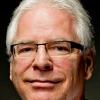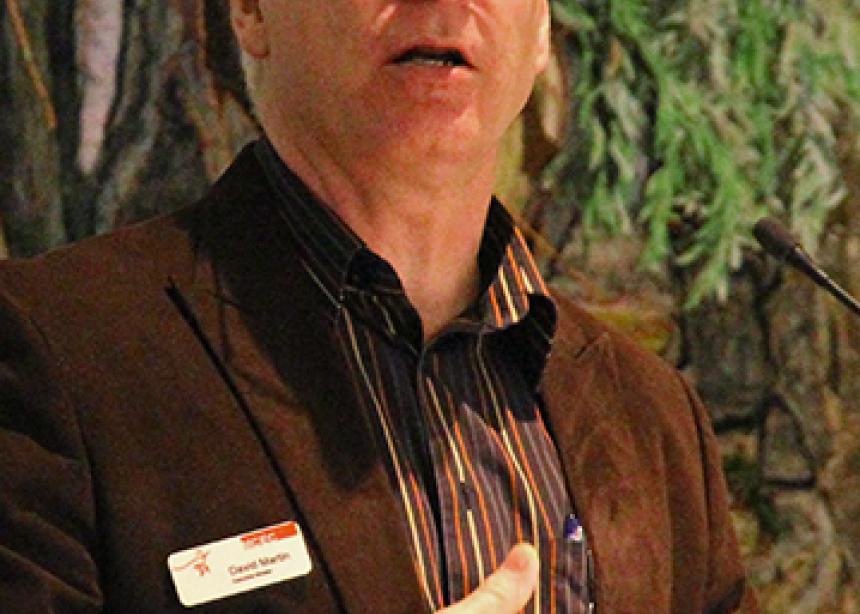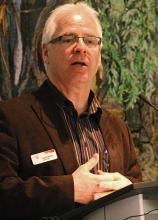In the words of David Martin, executive minister of Mennonite Church Eastern Canada, at the 2015 annual church gathering, “Since our habit is to normally talk about God in the abstract or to reflect on how my intellectual beliefs impact my values or actions, I have chosen to share with you more concretely how I have experienced the presence of God in my life.” We share his story as the first of an occasional series called “Faith Journeys.”
I grew up in a small Mennonite church west of Sudbury, in a family that had moved to Northern Ontario to do church planting. I grew up in a context in which I was always immersed in faith and a sense of God’s presence through bedtime prayers, Bible stories, Sunday school, Bible school and kids clubs.
But all of that shattered for me in my second year of university when John Rempel introduced me to the fascinating world of biblical studies at Conrad Grebel College. The intellectual and emotional conflict between what I was learning and the simple, naïve faith that I had inherited came to a breaking point. I collapsed into an acute clinical depression that pushed me to the brink of my coping abilities, including thoughts of suicide.
But over the next half-year, it felt like the unseen hand of God was at work, literally rebuilding my sense of self and my faith in a way that was stronger and more resilient.
Not many years later, in a book called Space for God, I was introduced to the image from Russian Orthodox spirituality of “descending with the mind into the heart.” No matter how extensively my understanding of faith or my experience of God has grown, I have discovered that “divine presence” and intellectual honesty are never at odds, but are always two integrated companions to authentic spirituality. Two strong aversions have been deeply seared into my heart from that challenging experience as a young adult:
- An experiential faith that is unwilling or fearful to open itself to intellectual rigour.
- A well-formed intellectual faith that is unwilling or fearful to abandon itself in trust to the experience of the divine.
Over the years, I have nurtured that kind of spirituality, and the disciplines of prayer and meditation have been a central part of my life and my experience of God. Although I am energized by engaging with others, I discovered that I am also energized by forms of prayer and silent retreats that draw me into deep quiet and solitude. When I began my role as executive minister, I engaged in a year-long discipline of doing the Ignatian Spiritual Exercises, which required an hour of prayer a day and a weekly check-in with a spiritual director. This also began an annual pattern for me of going on an eight-day silent, directed retreat.
This past summer, working with the text of Peter walking on the water, I imagined that I was Peter and suddenly I felt myself slipping beneath the waves. As I reached out and called to Jesus for help, I had an unexpected sensation of my arm being gripped strongly by Jesus. There was a moment of disbelief and awe in the realization that somehow I had been profoundly touched by the presence of Christ. I simply knew that “divine presence” was embracing me. That image has sustained me through some challenging times this past year.
While at times I have had a strong sense of inner spiritual experience, I have also had an equally strong sense of God’s presence in my life that has been mediated through other people or through external circumstances: the right word of wisdom, the timely offer of support, the generous and willing response to a request for help or the unexpected financial support that comes through when it is needed the most.
My life revolves around the church, my work is within the context of the church. Even my recreation is in the church. On Monday mornings I curl in a church-based curling club!
I’ve wondered about whether I should take the time to join a community curling club. Would that mean that I give up the church-based one that connects me ecumenically with other pastors?
My experience is that it is not just an issue of becoming more comfortable with talking about my faith experience, and finding everyday language to speak about it, but it is also the issue of even having the time or context in which to relate to people who are not connected with a faith community.
So how do I steward this gift of faith that I have received? I’m not always sure. Maybe it’s time for more prayer.
Also in the Faith Journeys series: A God bigger than this mess
To see a video of David Martin telling his faith story go to MCEC's “Sharing Our Faith LED Talks.”





Add new comment
Canadian Mennonite invites comments and encourages constructive discussion about our content. Actual full names (first and last) are required. Comments are moderated and may be edited. They will not appear online until approved and will be posted during business hours. Some comments may be reproduced in print.